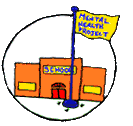![]()

|
Because school adjustment problems are so widespread and so in need of systemic attention, we are highlighting the concern through several facets of the Center's outreach efforts. It is a particularly Hot Topic in the wake of any disaster that results in students having to change schools.
It is only a matter of weeks (sometimes days) after students enter a new school or begin a new year that it is clear to most teachers which students are experiencing difficulties adjusting (e.g., to new content and standards, new schools, new teachers, new classmates, etc.). It is particularly poignant to see a student who is trying hard, but is disorganized and can’t keep up. If these difficulties are not addressed, student motivation for school dwindles, and behavior problems increase. This is the time to be proactive and to address any problems in the earliest stages. This is the time for staff development to focus on the type of strategies stressed in this guidance. This is the time for student support staff to work with teachers in their classrooms to intervene before problems become severe and pervasive and require referrals for out-of-class interventions. This guidance focuses on
enhancing engagement in learning working as a team to prevent problems from escalating. Also, included are links to in-depth prevention and early intervention strategies. SOME GUIDELINES: Through enhanced personal contacts, build a positive working relationship with the youngster and family. Focus first on assets (e.g. positive attributes, outside interests, hobbies, what the youngster likes at school and in class). Ask about what the youngster doesn't like at school. Explore the reasons for “dislikes” (e.g., Are assignments seen as too hard? as uninteresting? Is the youngster embarrassed because others will think s/he does not have the ability to do assignments? Is the youngster picked on? rejected? alienated?) Explore other possible causal factors. Explore what the youngster and those in the home think can be done to make things better (including extra support from a volunteer, a peer, friend, etc.). SOME BASIC STRATEGIES Try new strategies in the classroom – based on the best information about what is causing the problem. Enhance student engagement through (a) an emphasis on learning and enrichment options that are of current greatest interest and which the student indicates (s)he wants to and can pursue and (b) a temporary deemphasis on areas that are not of high interest. If a student seems easily distracted, the following might be used:
If a student needs more direction, the following might be used:
If the student has difficulty finishing tasks as scheduled, the following might be used:
TO ACCOMPLISH THE ABOVE: Enhance use of aides, volunteers, peer tutors/coaches, mentors, those in the home, etc. not only to help support student efforts to learn and perform, but to enhance the student’s social support network. Encourage structured staff discussions and staff development about what teachers can do and what other staff (mentors, student support staff, resource teachers, etc.) can do to team with teachers in their classrooms to enable school adjustment. WHAT IF THE ABOVE STRATEGIES DON'T WORK?
If the new strategies don't work, talk to others at school to learn about approaches they find helpful (e.g., reach out for support/mentoring/coaching, participate with others in clusters and teams, observe how others teach in ways that effectively address differences in motivation and capability, request additional staff development on working with such youngsters). After trying all the above, add some tutoring designed to enhance student engagement in learning and to facilitate learning of specific academic and social skills that are seen as barriers to effective classroom performance and learning. Only after all this is done and has not worked is it time to use the school’s referral processes to ask for additional support services. As such services are added, it, of course, becomes essential to coordinate them with what is going on in the classroom, school-wide, and at home.
THE FOLLOWING RESOURCES WILL BE HELPFUL FOR STRUCTURED STAFF DISCUSSIONS:
Other resources also can be readily found and accessed by topic through our Quick Find Online Clearinghouse -- see https://smhp.psych.ucla.edu/websrch.htm All Center materials are available for downloading, copying, and sharing on the Center website. Email: Ltaylor@ucla.edu Phone: (310) 206-5895 |
Back to Hot Topic Home Page
|
School Mental Health Project-UCLA Center for Mental Health in Schools WebMaster: Perry Nelson (smhp@ucla.edu) |
 |